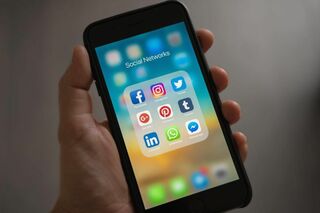TEENS & SCREENS
Social Media, Technology & Gaming
|
YouTube, texting, Instagram, gaming – kids as well as adults are spending more time in the virtual world of cyberspace than ever. Via computers and smart phones, we are “connected” to a constant barrage of electronic stimuli. This poses new challenges for today’s teens, such as the pressure to be connected 24/7, balancing cyber safety with freedom and access, and the very real concern that all the technological distractions combine to actually rewire the developing brain.
Common Sense Media offers some helpful basics… And this article offers some excellent talking points. |
VIDEO & PARENT UPDATE NOW AVAILABLE!
For families that missed B-PEN's forum on Teens and Screens: Finding Balance in the New Normal, the event offered a wealth of excellent advice on how families can establish realistic goals for navigating our busy digital lives. Check out the event recording!
And for easy reference, here's the new Parent Update. And this article offers some excellent talking points. And Norfolk Advocates for Children offers two good brochures worth checking out -- "Internet Safety: A Guide for Caregivers" and "Sexting Resource List for Parents."
SOCIAL MEDIA’S IMPACT ON MENTAL HEALTH: OPTIMIZING THE CONNECTION
Instagram, Snapchat, and Facebook foster a culture of peer comparison and entice users to stay online longer than they intend, which can foster discouraging or negative feelings. Snapchat locations and Instagram stories cause FOMO (Fear of Missing Out), contributing to anxiety, depression, and loneliness. This event helped parents/guardians and educators will learn individual and group strategies to optimize students' use of social media. Here's one take-away of excellent tips!
For families that missed B-PEN's forum on Teens and Screens: Finding Balance in the New Normal, the event offered a wealth of excellent advice on how families can establish realistic goals for navigating our busy digital lives. Check out the event recording!
And for easy reference, here's the new Parent Update. And this article offers some excellent talking points. And Norfolk Advocates for Children offers two good brochures worth checking out -- "Internet Safety: A Guide for Caregivers" and "Sexting Resource List for Parents."
SOCIAL MEDIA’S IMPACT ON MENTAL HEALTH: OPTIMIZING THE CONNECTION
Instagram, Snapchat, and Facebook foster a culture of peer comparison and entice users to stay online longer than they intend, which can foster discouraging or negative feelings. Snapchat locations and Instagram stories cause FOMO (Fear of Missing Out), contributing to anxiety, depression, and loneliness. This event helped parents/guardians and educators will learn individual and group strategies to optimize students' use of social media. Here's one take-away of excellent tips!

Parent Update: Tips on Building Healthy Video Gaming Habits
Video and online gaming has become such a norm for many adolescents that it can sometimes get out of hand before we know it, with kids staying up into the wee hours and losing sleep. General health and schoolwork can suffer in the process. Nearly 200 parents signed up for B-PEN’s parent presentation by expert Dr. Alok Kanojia, who offered information on the allure of games, how gaming can disrupt mental health and social development, and what parents can do to set – and maintain – appropriate limits. Key takeaways can be found in this new tip sheet. And Boston Globe subscribers can check out Beth Teitell's excellent piece on the serious impact unrestricted gaming can have on adolescents.
Video and online gaming has become such a norm for many adolescents that it can sometimes get out of hand before we know it, with kids staying up into the wee hours and losing sleep. General health and schoolwork can suffer in the process. Nearly 200 parents signed up for B-PEN’s parent presentation by expert Dr. Alok Kanojia, who offered information on the allure of games, how gaming can disrupt mental health and social development, and what parents can do to set – and maintain – appropriate limits. Key takeaways can be found in this new tip sheet. And Boston Globe subscribers can check out Beth Teitell's excellent piece on the serious impact unrestricted gaming can have on adolescents.
|
Media Literacy
Simply put, media literacy is the ability to read between the lines to recognize the influence of media messages. Children who are media literate can look and listen with a critical eye and ear, helping them to make healthier lifestyle choices and avoid the pressures fueled by media messages to drink, smoke or use other drugs. Today, as never before, the lives of children are saturated with commercial marketing, targeted through DVDs, video games, the Internet, MP3 players, and cell phones. What do parents need to know about helping their adolescents develop healthy media literacy? One of the best sites to help navigate the challenges parents face in the digital world is CommonSenseMedia.org. Ask The Mediatrician Boston Children’s Hospital pediatrician Dr. Michael Rich is a media enthusiast who offers his expertise via the Center on Media and Child Health. Parents can pose questions and get answers about how media use is affecting our children, with topics ranging from cyberbullying to the impact of multi-tasking on brain development. |
Try this: Watch any TV show with your child. When the commercials come on, ask your child to pay close attention, then pose these questions to help decode the message:
|
Gifting Technology to Teens
For holidays, birthdays and special occasions, some of the hottest gift items for kids of all ages continue to be electronics, from phones and tablets to e-readers and video games. If you give a digital gift, we urge you to include some parental guidelines for responsible use. The constant stream of stimuli that electronic devices offer can draw kids into hours of unproductive and ultimately unhealthy behavior that can lead to focusing and learning challenges. Take time to talk about basic limits for use and good cyber citizenship.
For holidays, birthdays and special occasions, some of the hottest gift items for kids of all ages continue to be electronics, from phones and tablets to e-readers and video games. If you give a digital gift, we urge you to include some parental guidelines for responsible use. The constant stream of stimuli that electronic devices offer can draw kids into hours of unproductive and ultimately unhealthy behavior that can lead to focusing and learning challenges. Take time to talk about basic limits for use and good cyber citizenship.
Additional Reading and Resources
- Digizen
- Stop.Think.Connect.
- wired safety
- Common Sense Media's 5 Reasons You Don't Need to Worry About Kids and Social Media
- Technology Boundaries for Children and Teens
- How to Delete Your Google+
- 10 Steps to Screen-Proof Your Home
- Common Sense Media's 6 Media Resolutions Every Family Should Make in 2018
- FTC’s online security tips and resources - https://www.consumer.ftc.gov/features/feature-0038-onguardonline
- Internet Safety 101 https://internetsafety101.org/parentsguidetosocialmedia
- Mindful Media Resources Compiled by Sarah Krongard, PhD

